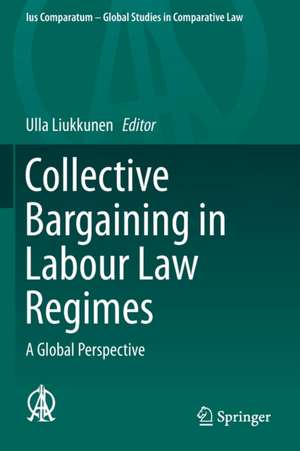Collective Bargaining in Labour Law Regimes: A Global Perspective: Ius Comparatum - Global Studies in Comparative Law, cartea 32
Editat de Ulla Liukkunenen Limba Engleză Paperback – 17 oct 2020
Recent development of collective bargaining regimes can be viewed as part of a larger development of labour law models that face increasing challenges caused by globalization and transition of work and workplaces. The book places particular emphasis on identifying and examining most important development trends affecting domestic labour law regimes and collective bargaining and regulatory responses thereto. The analysis offered extents to transnational dimension of collective bargaining.
As the chapters analyse the influence of the legal frameworks of collective bargaining in different countries they provide unique comparative insight into the topic which is central to understanding thefunction of labour law.
| Toate formatele și edițiile | Preț | Express |
|---|---|---|
| Paperback (1) | 1014.76 lei 6-8 săpt. | |
| Springer International Publishing – 17 oct 2020 | 1014.76 lei 6-8 săpt. | |
| Hardback (1) | 1021.05 lei 6-8 săpt. | |
| Springer International Publishing – 17 oct 2019 | 1021.05 lei 6-8 săpt. |
Din seria Ius Comparatum - Global Studies in Comparative Law
- 18%
 Preț: 1584.40 lei
Preț: 1584.40 lei - 18%
 Preț: 1009.22 lei
Preț: 1009.22 lei - 18%
 Preț: 1573.51 lei
Preț: 1573.51 lei - 18%
 Preț: 1255.16 lei
Preț: 1255.16 lei - 24%
 Preț: 1515.09 lei
Preț: 1515.09 lei - 24%
 Preț: 802.74 lei
Preț: 802.74 lei - 15%
 Preț: 651.84 lei
Preț: 651.84 lei - 18%
 Preț: 958.56 lei
Preț: 958.56 lei - 24%
 Preț: 812.86 lei
Preț: 812.86 lei - 15%
 Preț: 653.33 lei
Preț: 653.33 lei - 15%
 Preț: 654.43 lei
Preț: 654.43 lei - 18%
 Preț: 1401.16 lei
Preț: 1401.16 lei - 18%
 Preț: 1007.80 lei
Preț: 1007.80 lei - 18%
 Preț: 898.89 lei
Preț: 898.89 lei - 18%
 Preț: 956.99 lei
Preț: 956.99 lei - 18%
 Preț: 789.98 lei
Preț: 789.98 lei - 15%
 Preț: 644.95 lei
Preț: 644.95 lei - 18%
 Preț: 953.97 lei
Preț: 953.97 lei - 18%
 Preț: 1009.85 lei
Preț: 1009.85 lei - 18%
 Preț: 955.08 lei
Preț: 955.08 lei - 18%
 Preț: 2787.02 lei
Preț: 2787.02 lei - 18%
 Preț: 1010.03 lei
Preț: 1010.03 lei - 18%
 Preț: 1403.67 lei
Preț: 1403.67 lei - 18%
 Preț: 2114.90 lei
Preț: 2114.90 lei - 18%
 Preț: 2107.49 lei
Preț: 2107.49 lei - 18%
 Preț: 997.71 lei
Preț: 997.71 lei - 18%
 Preț: 955.40 lei
Preț: 955.40 lei
Preț: 1014.76 lei
Preț vechi: 1237.51 lei
-18% Nou
Puncte Express: 1522
Preț estimativ în valută:
194.20€ • 200.62$ • 161.62£
194.20€ • 200.62$ • 161.62£
Carte tipărită la comandă
Livrare economică 26 martie-09 aprilie
Preluare comenzi: 021 569.72.76
Specificații
ISBN-13: 9783030169794
ISBN-10: 3030169790
Pagini: 622
Ilustrații: VI, 622 p. 11 illus., 1 illus. in color.
Dimensiuni: 155 x 235 mm
Greutate: 0.87 kg
Ediția:1st ed. 2019
Editura: Springer International Publishing
Colecția Springer
Seria Ius Comparatum - Global Studies in Comparative Law
Locul publicării:Cham, Switzerland
ISBN-10: 3030169790
Pagini: 622
Ilustrații: VI, 622 p. 11 illus., 1 illus. in color.
Dimensiuni: 155 x 235 mm
Greutate: 0.87 kg
Ediția:1st ed. 2019
Editura: Springer International Publishing
Colecția Springer
Seria Ius Comparatum - Global Studies in Comparative Law
Locul publicării:Cham, Switzerland
Cuprins
Part I General Report.- Collective Bargaining in Labour Law Regimes.- Part II National Reports.- Belgium.- Brazil.- Canada.- Czech.- China.- Croatia.- Denmark.- France.- Germany.- Greece.- Hungary.- Italy.- Japan.- Macau.- Poland.- Quebec.- Russia.- Slovenia.- Spain.- Sweden.- Taiwan.- USA.
Notă biografică
Ulla Liukkunen, Professor of Labour Law and Private International Law at the University of Helsinki, Docent of the University of Helsinki, Director of the Finnish Center of Chinese Law and Chinese Legal Culture, Leader of two Finnish Academy funded research projects concerning international and comparative labour law, Finnish Academy Research Fellow in labour law, Senior Researcher of the Finnish Academy Centre of Excellence in 2008-2013, Memberships of several international research projects in the field of international and EU labour law, Member of the Board Member of the European China Law Studies Association, Multiple publications in the fields of labour law and private international law, including six monographs, four co-edited books and several peer-reviewed journal articles.
Textul de pe ultima copertă
This book addresses the theme of collective bargaining in different legal systems and explores legal framework of collective bargaining as well as the role of different bargaining models in domestic labour law systems in altogether twenty-one jurisdictions throughout the world.
Recent development of collective bargaining regimes can be viewed as part of a larger development of labour law models that face increasing challenges caused by globalization and transition of work and workplaces. The book places particular emphasis on identifying and examining most important development trends affecting domestic labour law regimes and collective bargaining and regulatory responses thereto. The analysis offered extents to transnational dimension of collective bargaining.
As the chapters analyse the influence of the legal frameworks of collective bargaining in different countries they provide unique comparative insight into the topic which is central to understanding the function of labour law.
Recent development of collective bargaining regimes can be viewed as part of a larger development of labour law models that face increasing challenges caused by globalization and transition of work and workplaces. The book places particular emphasis on identifying and examining most important development trends affecting domestic labour law regimes and collective bargaining and regulatory responses thereto. The analysis offered extents to transnational dimension of collective bargaining.
As the chapters analyse the influence of the legal frameworks of collective bargaining in different countries they provide unique comparative insight into the topic which is central to understanding the function of labour law.
Caracteristici
Provides unique worldwide comparative information about collective bargaining models in different jurisdictions Offers fresh perspectives and insights on topical challenges that domestic collective bargaining regimes face and examines domestic solutions developed as a response Analyses the profound transition of collective bargaining regimes taking place in several domestic systems, including increasing decentralization of collective bargaining in many countries, and reasons behind, as well as an the evolving transnational dimension of collective bargaining













